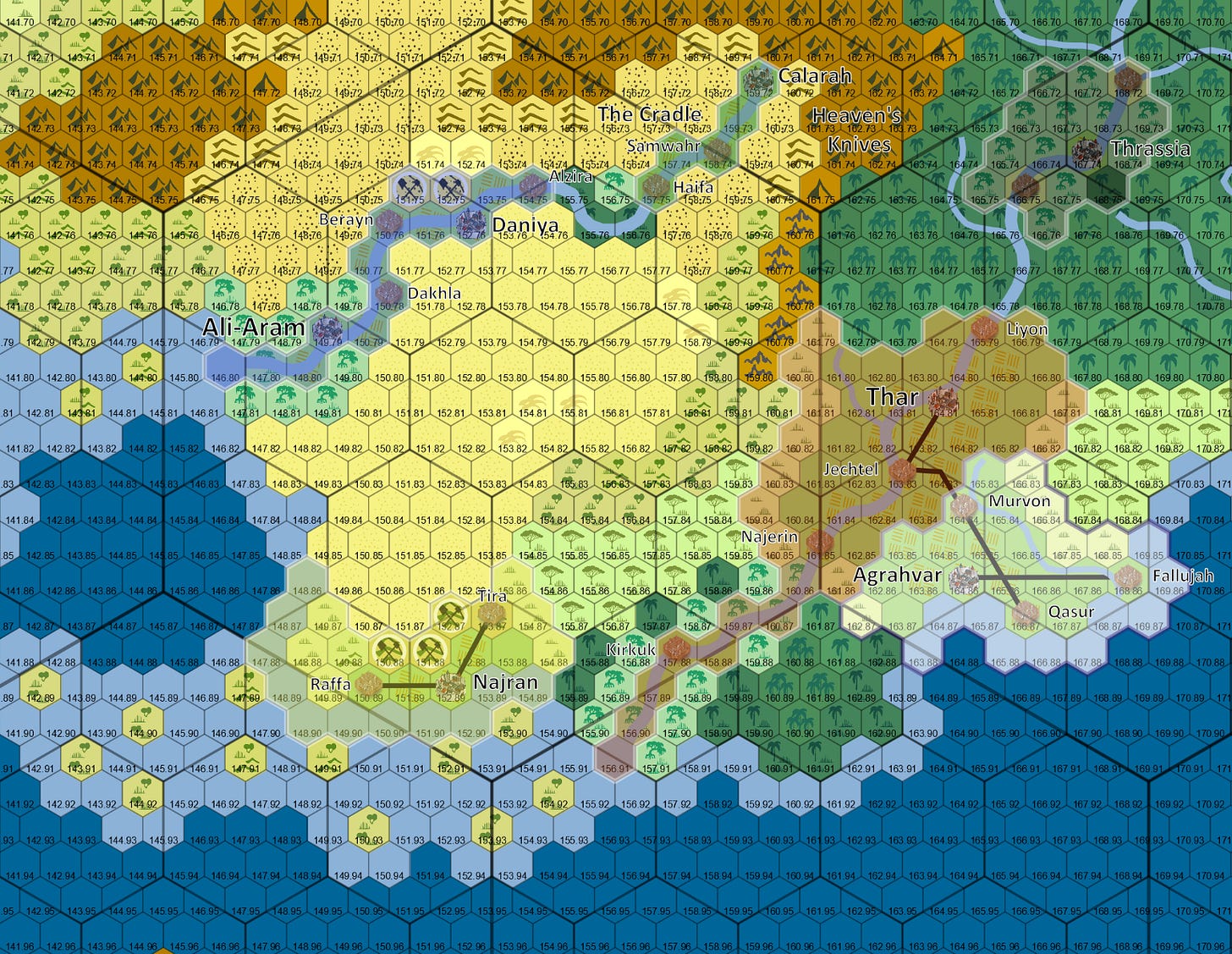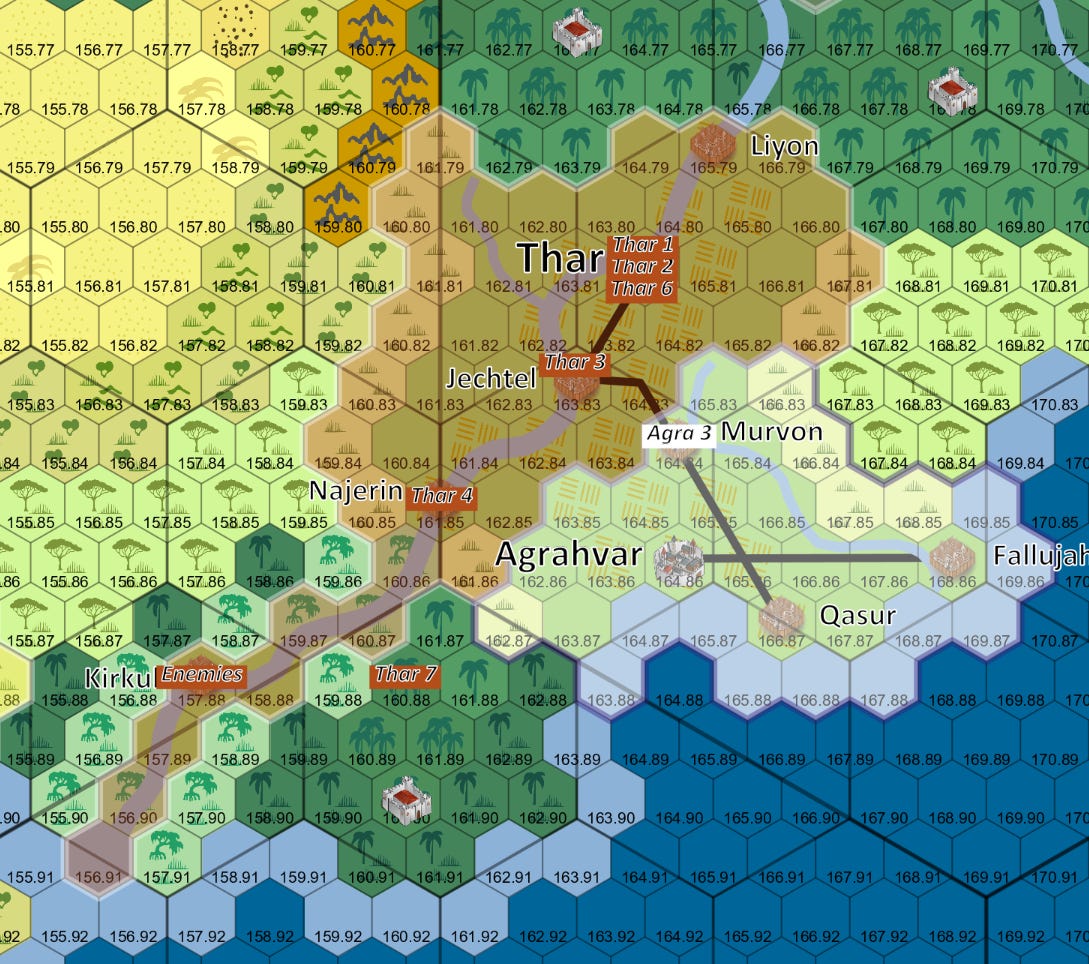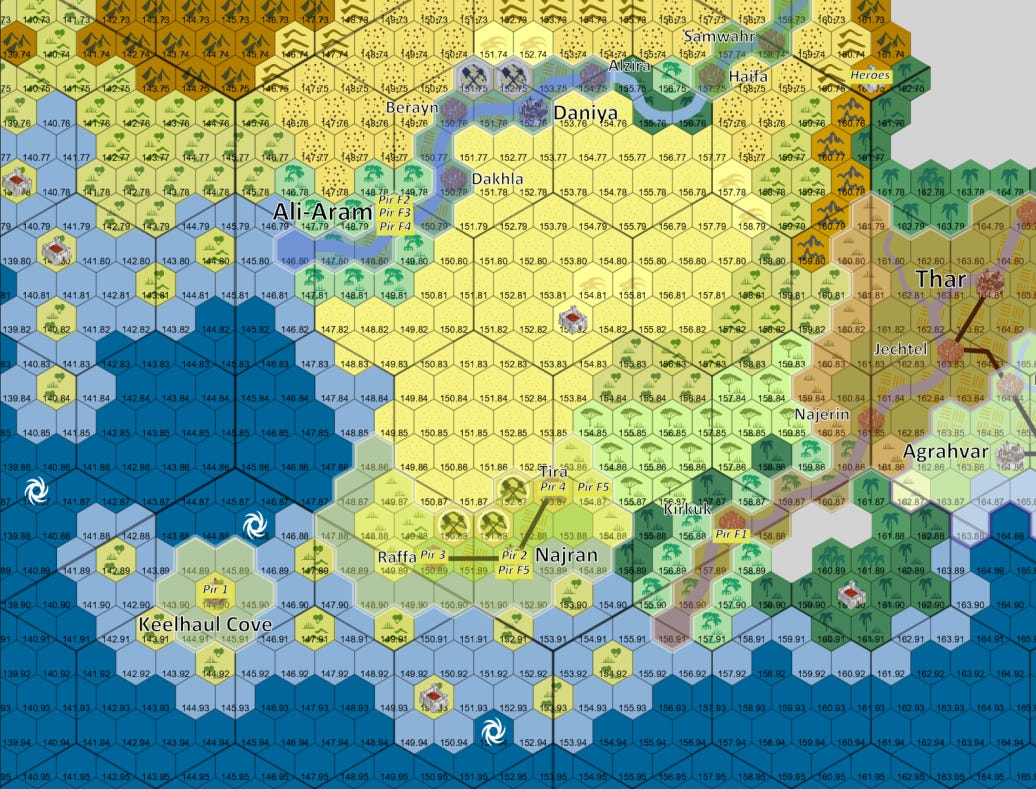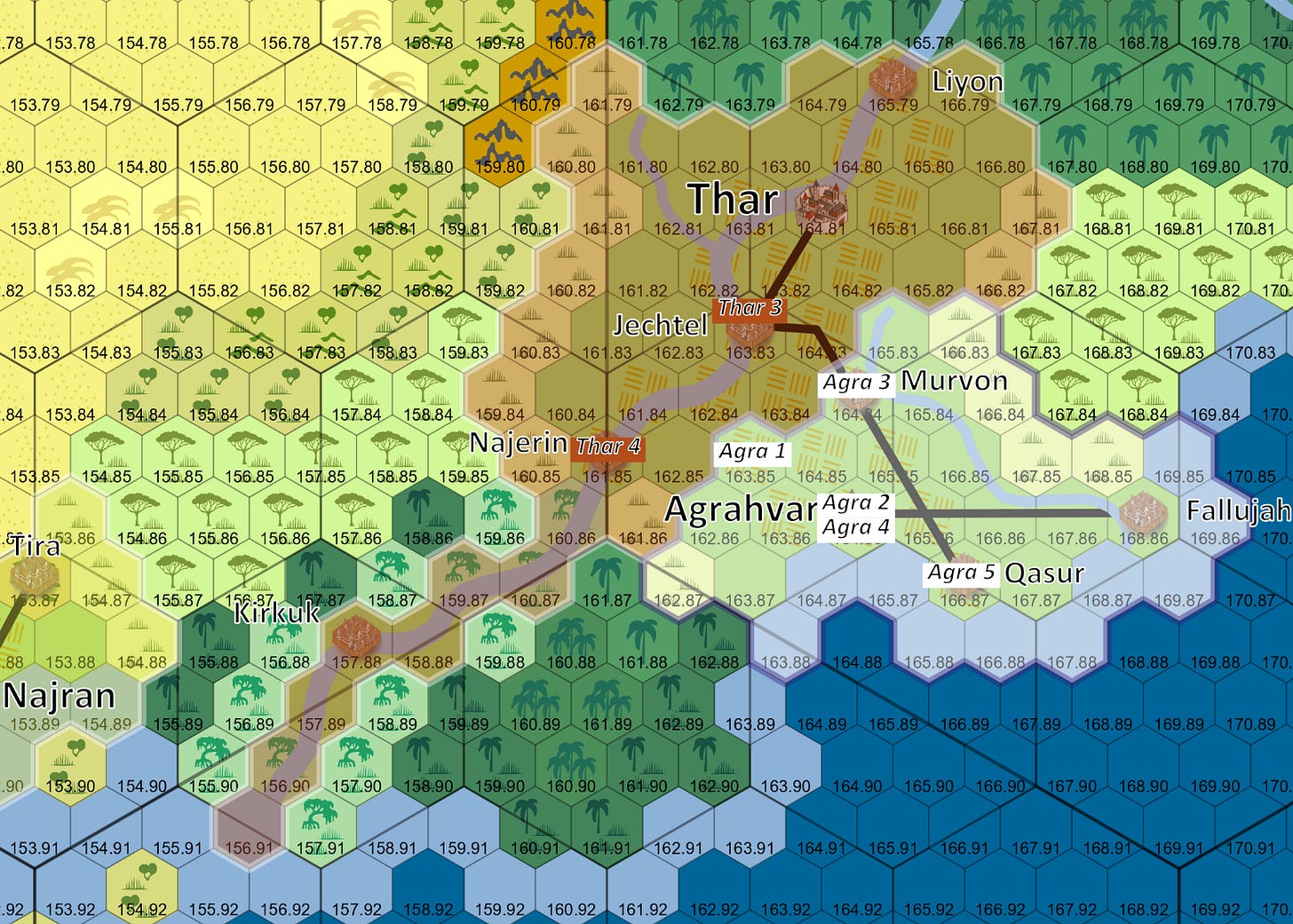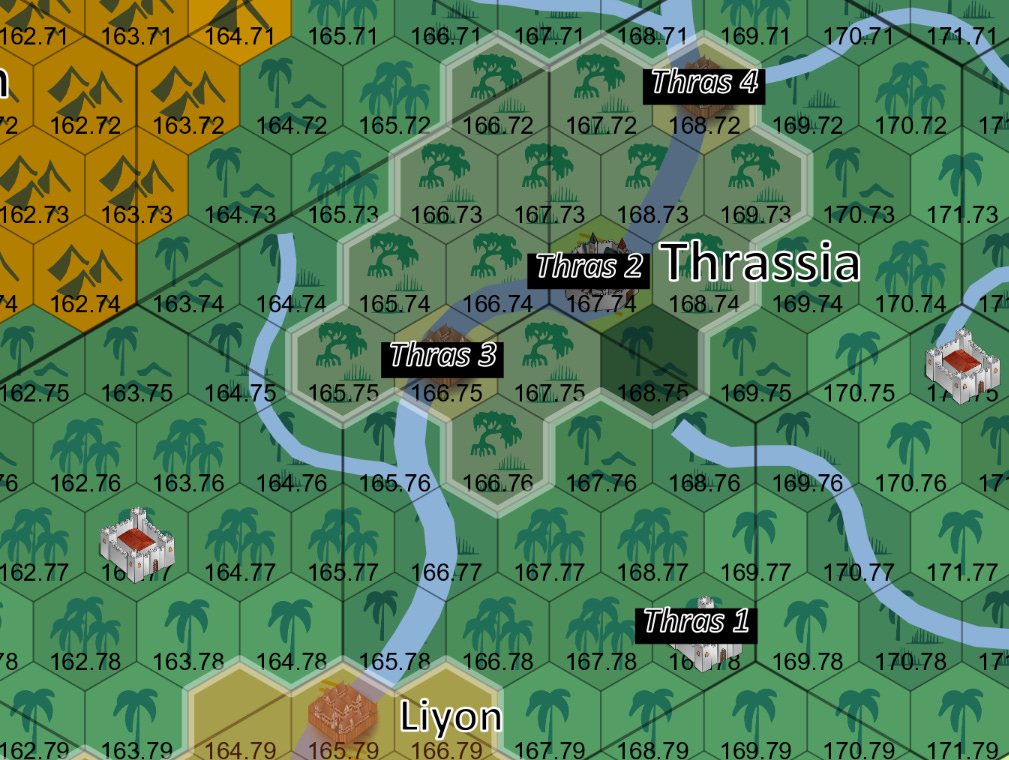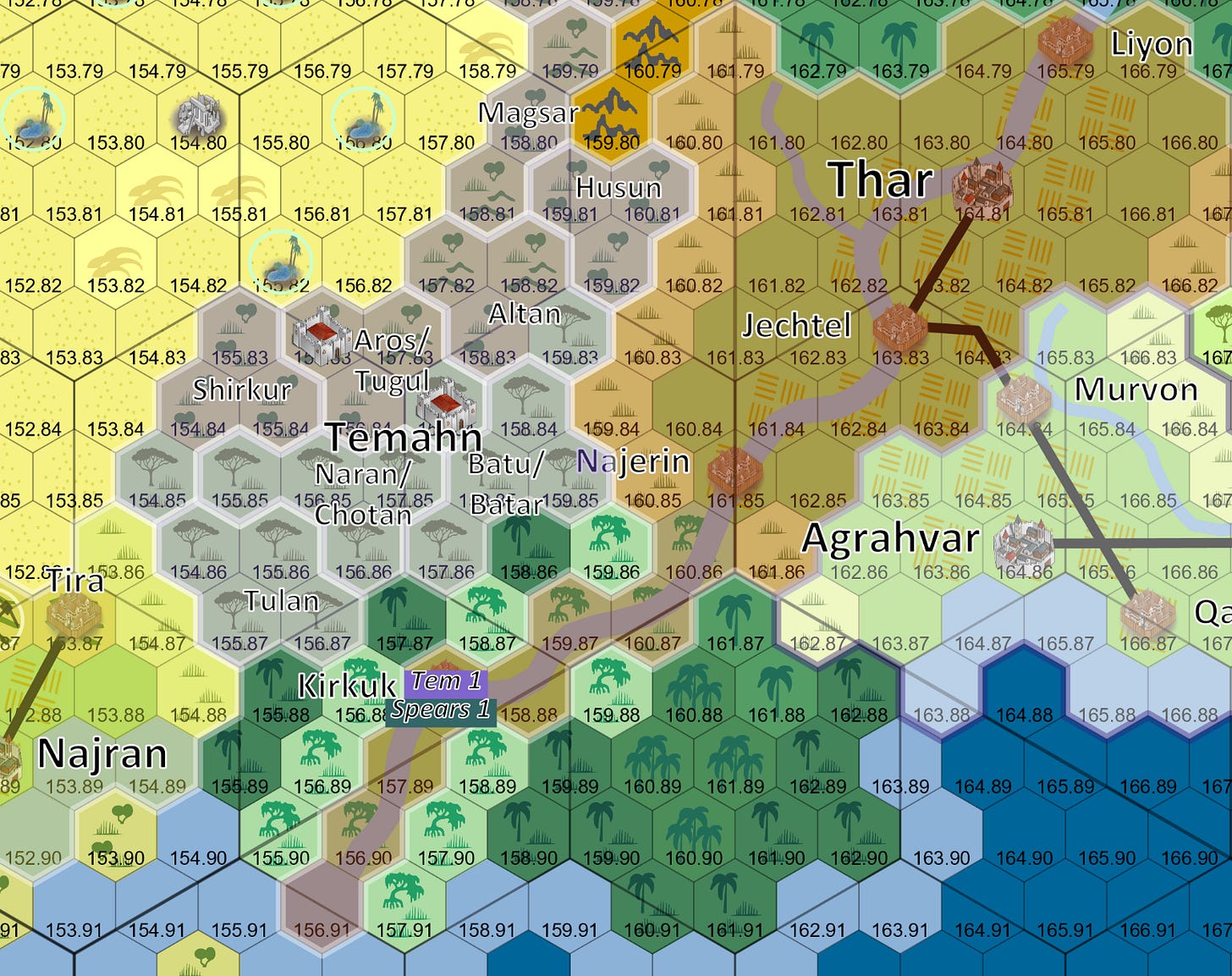The Third Week
Schemes & Solidification
Returning from a gap over some of my players’ Spring Break, there were no open battles this week, but many secret conversations, careful arrangements, and backroom deals. Regions shift hands, forces are consolidated, schemes are wrought, and the private discussion channels I initially set up are starting to see extensive use. And I have a lead on a potential replacement player for one of the northern Lawful states, so I’m hoping that pans out; the current crop of players seem to be having a blast and that certainly helps the recruitment effort.
The Annals of War
The northern armies of Thar reconsolidate at the city of Thar itself, there to gather for a return strike against the lizardmen who pillaged Liyon only to slink off to their swamps now, or perhaps against the Temahni raiders who’ve ravaged Kirkuk.
Scrying on the town of Kirkuk in particular reveals that not only have the Temahn plundered the town until a bare remnant remains, but they’ve been aided by a band of northern mercenaries and cavalry from Ali-Aram. Come the week’s end, that force in turn appears to hand the city off to pirates . . .
Thar 7 marches north from the dungeon to meet its transport vessels at the river, laden with plunder from the depths of the crypt they unveiled, the Caliph himself most pleased with his army’s narrow evasion of an unknown force.
Unknown to the uruks and Thari soldiers, an infiltrator has slipped among their midst — none less than the Pirate King Somerton himself, a master-assassin who infiltrated their force in a single night, and now lays low.
The Sultan Fairuz, taking command of Somerton’s force left behind at the dungeon, beats a retreat to the sea and from there back to Najran, dispatching the pirate vessels north to Kirkuk after intense discussions with the Temahn. The Sultan himself journeys to the edge of Temahni lands east of Tira, to finalize the negotiations in person.
When the pirate vessels reach Kirkuk, they are welcomed into the plundered remains of the town with great feasts, and though they despair of the town being worth much in its ravaged state, they’re little inclined to argue with the grand host of savage Temahn encamped outside it. Within the town, the few remaining peasants of Kirkuk latch onto the occupiers, every man among the pirate crews seeming to have found a wife twice over, and a manservant to boot, to their captain’s despair. (A creative interpretation of the Camp Followers vagary.)
In Ali-Aram to the north, Sage Somerton, foremost Shaman of the Shining Seas, calls upon her spirits to heal the oft-injured Merchant Prince Ainsworth, before calling a flight of pegasi to escort her and most of her companions far to the east, traversing the desert in only two nights to reach the the southern peaks of the Cradle, there to delve another dungeon and recover potent items indeed: a Rod of Cataclysms, a Ring of Invisibility, and a Scroll of Shadeveil. Some lives were spent in the effort, but for such a prize, who could say it was not worth it?
Back in Ali-Aram, Ainsworth found himself immediately recovered, a blessing of the spirits that came with dark visions. But in speaking with the guard captain who they’d made contact with previously, he finds the captain chafing under the High Priestess’ firm rule, and over the course of the week persuades him to back a coup that would leave the guard captain a vassal ruler of that great city itself if only Ainsworth can arrange for forces to bolster the defense when Daniya musters the cities of the north to reclaim the holy city. Luckily, Ainsworth has a pirate fleet waiting just offshore, for just such an opportunity, the the time passes swiftly putting the details in order . . .
In Agrahvar, armies undergo modest reorganization to concentrate striking force in the west. Scrying leads to the capture of valuable prisoners, who break under torture and complete the Sultan’s knowledge of Thar’s proximate defenses. He is a patient man, happy to test the borders and provoke response from Thar for now, and well-armed with knowledge of his rival.
Come the week’s end, he received emissaries from Thrassia to the north, with their own offers of joint action.
Thrassia as well spent this week more cautiously, withdrawing to a dungeon ruin amidst the jungle that might soon be plundered, and newly veiling himself in indiscernibility to foil the Caliph’s own scrying (confusion enhanced by his choice not to do so thus far). Secure in the jungle and beyond magical detection, it seems improbable others will find him, and come the end of the month he expects yet more lizardmen to flock to his banner from the swamps, drawn by tales of the vast plunder he has extracted and now made good his escape with.
Of the Temahn, much has already been said — Kirkuk pillaged into the ground, a deal struck with Sultan Fairuz of Najran, the town’s remnants turned over to pirates. The Kagan does find that, having received his cut of the plunder, one of his vassal chiefs never returned from a scouting expedition to the east. Most likely, he thinks it simple desertion, that chief having been ever independently minded, but he has some concern of lizardmen from the river perhaps seizing them in the night, fueled by warnings from his mercenary allies, the Spears of Heaven.
And last, the many Minor Actors. The Spears have been soliciting new contracts as their service with the Temahn draws to a close, trying to push Thar and Agrahvar into a bidding war that neither seems terribly inclined to engage in yet.
In Najran, the Quiet Guild there caught infiltrators of the Pirate Lord who sought to establish a rival syndicate there, and has struck a deal to have such services subcontracted through them in the future.
The Wasted Breaths — brigands opportunistically turned mercenaries — plunder along the edges of Ali-Aram’s river-holdings, but it sounds as if they may have found better service in the south with Agrahvar?
A grand “merchant galley” arrived in Thar, noted there by customs inspectors, for while it does indeed hold a precious cargo, where merchants usually pilot sailing ships and have galleys as escorts, this merchant-captain commands a “superdreadnaught” 8-rower galley that alone stands a match for half the Thari fleet. The harbormaster is rightfully uneasy.
And at the heart of his web, a spymaster in Ali-Aram has caught rumors hinting at rebellion and danger within his own city, and we shall see if he can uncover the coup aimed at the the High Priestess in time to stop it . . . if he even wants to.
Mechanical Considerations
While army movement usually happens on a weekly basis, considering that pillaging and abstract dungeoneering happen on a daily basis, I’ve often ended up zooming in to a day-by-day level of abstraction where it would be relevant. Having that flexibility, while still operating on a system of weekly orders, has worked out nicely — especially considering that I’ve mostly avoided needing to consult players for new input outside the normal submission of weekly orders. At this scale, some time lag between consultations with subordinates is pretty reasonable, especially considering that most factions are using shared dreams or avian messengers to do so.
Since it was asked on the ACKS Discord last week, I thought I’d add here my general approach to player input on the battles that have come up:
If players know they’re going to get into a fight in a given week, I ask them to include some general guidance on their stance and tactics in their report.
If no PCs are directly in command in the battle, then I’ll resolve it based on the personalities and statistics of the relevant characters.
If a PC will directly be in command of one side of a battle, I’ll get input from him if anything substantially changes in the course of that battle.
If PCs will directly be in command of both sides, I plan to check in with both and see if there’s a time we can play it out. This hasn’t come up yet though, so if scheduling proves difficult it may turn out more like periodic orders when things substantially change.
On the topic of pillaging, while it hasn’t become relevant yet, I’ve decided to modify the effective number of creatures participating in a pillage based on their size (the default rule is just based on the flat number of creatures). This seems somewhat necessary, inasmuch as a dragon will be more effective at pillaging than a single human soldier. The most notable consequence of this in practice is that it doubles the effectiveness of humanoid cavalry in pillaging, such that a unit of cavalry pillages at the same rate as infantry (and indeed, as any other full strength unit), but this seems very reasonable to me. Being able to carry off plunder on a horse should help.
While I haven’t reached a decision yet, in the course of reading up on Pyrrhus of Epirus, I found a reference to pursuit of fleeing forces being obstructed by rough terrain, and on that basis I’m considering applying a terrain modifier to pursuit rolls. Were I to do so, I might also apply one for time of day, to permit the well-attested tactic of mitigating potential losses (and potential gains) by delaying the offer of battle until afternoon, so that the battle would have to stop at nightfall and pursuit would be hindered.
On the whole, however, nothing has substantively changed this week except that some reconnaissance rolls are worse now that I’m applying the scouting bonus for having large cavalry forces correctly. The players are very much enjoying themselves, and mostly enjoying the open-endedness of the scenario, though one has sought more guidance and I’m putting together a list of generic options he might consider (and linking him to the Strategemata, a true gem for exploring the tricks of the trade of ancient generalship). Good times.
Addendum: wargame reports from the Intro, Week 1, Week 2, Week 3, Week 4, Week 5, Week 6, and Week 7 are all available.


